Fiberglass vs. Vinyl Windows: Which is better?
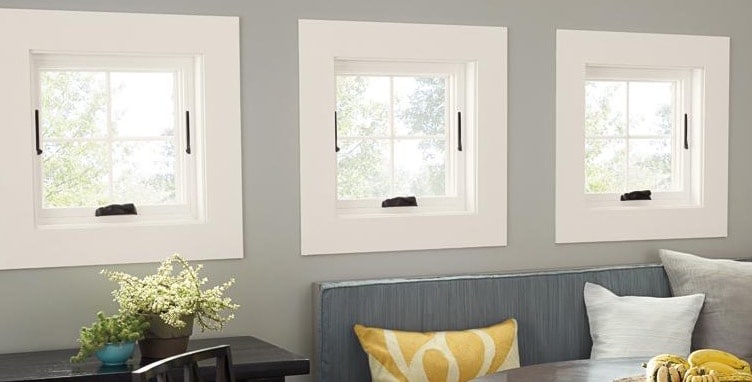
Similarities, differences, and the bottom line
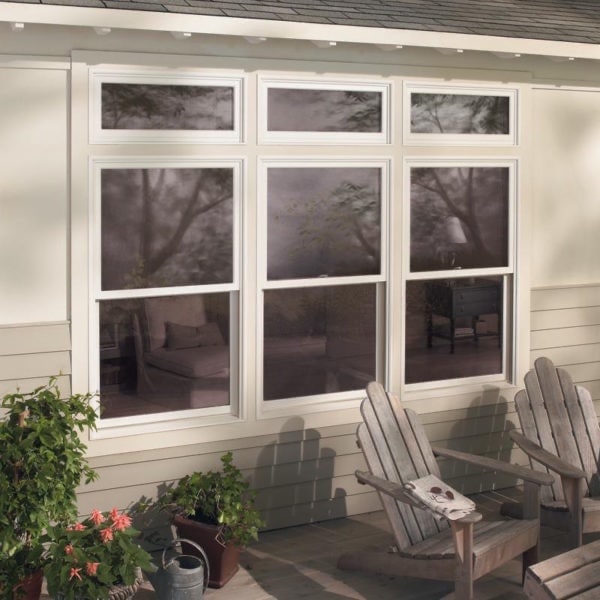 Both fiberglass and vinyl windows have been around for quite some time, though recent developments in fiberglass windows have given them greater strength, durability, and efficiency. Though fiberglass is generally more expensive, these durable windows are taking market share away from high-end vinyl. Vinyl windows are made from polyvinyl chloride (PVC), with an inner structure that can include metal. Fiberglass windows are made from polyester resins that are activated by a catalyst, and then pulled through a heated die, after which glass mats or strands are combined with resins. The result is a light, strong material that has been used to create products like skis and furniture.
Both fiberglass and vinyl windows have been around for quite some time, though recent developments in fiberglass windows have given them greater strength, durability, and efficiency. Though fiberglass is generally more expensive, these durable windows are taking market share away from high-end vinyl. Vinyl windows are made from polyvinyl chloride (PVC), with an inner structure that can include metal. Fiberglass windows are made from polyester resins that are activated by a catalyst, and then pulled through a heated die, after which glass mats or strands are combined with resins. The result is a light, strong material that has been used to create products like skis and furniture.
Which raises the question: why are more people choosing fiberglass? We compare fiberglass and vinyl in the crucial factors you want to consider:
- Strength & Durability
- Performance
- The Look: Finish/Color/Paintability
- Maintenance
- “Green” Score
- Cost
- Resale Value
1. Strength & Durability
Fiberglass windows are stronger and more durable than vinyl windows, so if your plans are for a long-term solution—or you’re concerned about resale, which we discuss below—fiberglass is a better choice. Because it is stronger, fiberglass is less likely to warp, twist, or soften. This is especially true for Integrity windows from Marvin—the model we carry—which are made from a particularly durable “pultruded” fiberglass. It’s eight times stronger than vinyl (and three times stronger than vinyl/wood composite). Fiberglass windows can last nearly 40% longer than vinyl. Over time, vinyl windows tend to sag more, since they’re also not as rigid as fiberglass.
While strength is important, if your windows are framed properly, vinyl can do well in this regard, as the windows won’t need to support any structural weight.
Neither vinyl nor fiberglass window frames will rot, or be threatened by insects, so they are of comparable durability in that comparison, and both are superior to wood.
Winner: Fiberglass.
2. Performance
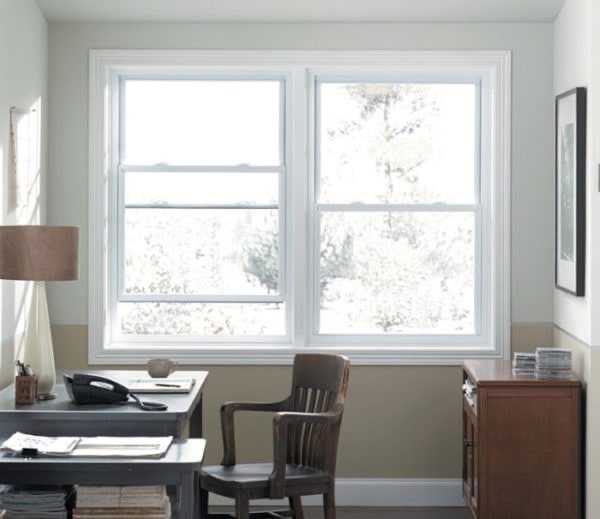 Window performance comes down to two major factors: the glass, and the window frame. Since the frame is less important in this regard, the superior insulating properties of fiberglass (think insulation) are less of a factor. While both materials insulate well, construction can make a difference; vinyl windows often contain air chambers in their frames interior, which can be filled with insulating foam, giving many vinyl window frames an advantage overall. All other factors being equal (glass type, glass layers, glass fill, etc.), well-made vinyl frames can insulate a bit better. Check the specifications for overall R-value of individual window models for this comparison.
Window performance comes down to two major factors: the glass, and the window frame. Since the frame is less important in this regard, the superior insulating properties of fiberglass (think insulation) are less of a factor. While both materials insulate well, construction can make a difference; vinyl windows often contain air chambers in their frames interior, which can be filled with insulating foam, giving many vinyl window frames an advantage overall. All other factors being equal (glass type, glass layers, glass fill, etc.), well-made vinyl frames can insulate a bit better. Check the specifications for overall R-value of individual window models for this comparison.
A secondary factor which can grow in importance over time: expansion and contraction of the frame. Since fiberglass tends to expand and contract at almost the same rate as glass, there are generally fewer seal failures in windows made with it. Over time, vinyl, which expands and contracts at a rate of more like eight times the glass, creates more seal failures, frame gaps, and leakage.
Winner: Roughly equal, with slight advantage to fiberglass over the long run.
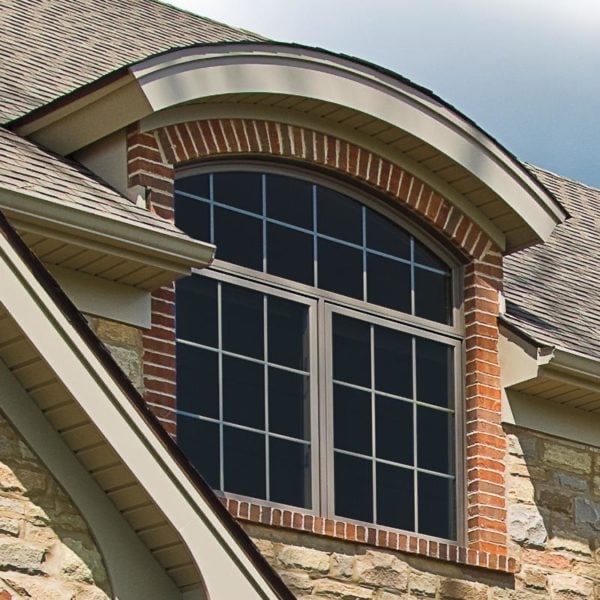 3. The Look: Finish/Color/Paintability
3. The Look: Finish/Color/Paintability
If you’re looking to get a non-wood window with the look of wood, fiberglass is the clear winner, with a convincing wood look. Fiberglass can also be painted. Vinyl cannot. Both vinyl and fiberglass window frames can be created in different colors, so they are comparable there. One big advantage for fiberglass: unlike vinyl, it can be painted.
Fiberglass windows have more glass showing than vinyl window frames. Since fiberglass is a stronger material, less is needed to support the glass, so fiberglass frames are thinner and take up less of the window’s area than vinyl, resulting in more glass, and more light.
Winner: Fiberglass.
4. Maintenance
This is a virtual dead heat. Unlike wood, both vinyl and fiberglass require very little maintenance and upkeep. You’ll get many care-free years from both, though as stated earlier, fiberglass will tend to last longer before failure.
Winner: Tie.
5. “Green” Score
Fiberglass windows are considered more eco-friendly than vinyl, since they are made up of roughly 60% glass, which can be recycled. Vinyl is a synthetic, and is much more difficult to repurpose. Fiberglass also requires nearly 40% less energy to produce than vinyl.
Winner: Fiberglass.
6. Cost
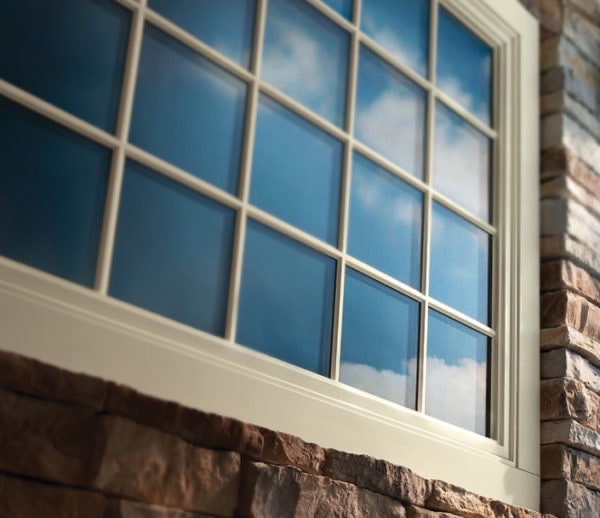 Under current production methods, fiberglass is more expensive to produce than vinyl—roughly 15%-30% more—so fiberglass windows cost more than vinyl windows (roughly one-and-a-half times the cost). New construction fiberglass windows are also not considered an “off-the-shelf” product, so they are not generally recommended for a do-it-yourself (DIY) project. If you’re a DIY-er, vinyl windows are almost always available off the shelf, so you can save on installation of vinyl windows. This price difference is what brings vinyl windows back into regular competition with the otherwise superior fiberglass windows.
Under current production methods, fiberglass is more expensive to produce than vinyl—roughly 15%-30% more—so fiberglass windows cost more than vinyl windows (roughly one-and-a-half times the cost). New construction fiberglass windows are also not considered an “off-the-shelf” product, so they are not generally recommended for a do-it-yourself (DIY) project. If you’re a DIY-er, vinyl windows are almost always available off the shelf, so you can save on installation of vinyl windows. This price difference is what brings vinyl windows back into regular competition with the otherwise superior fiberglass windows.
Winner: Vinyl.
7. Resale Value
If you’re thinking about eventual resale value for your home, fiberglass is considered a better investment than vinyl, with a larger return on your investment. Buyers will pay more for a home with more durable fiberglass windows.
Winner: Fiberglass.
Bottom Line
Let’s look at the factors in our evaluation…
- Fiberglass windows are stronger and more durable
- Both are evenly matched in insulating performance, with Fiberglass doing better over the longer run
- Fiberglass lasts much longer, with a nearly 40% longer useful life expectancy
- Vinyl is definitely cheaper, though fiberglass can compare favorably to high-end vinyl windows
- Design flexibility (colors, wood grain option, paintability) gives fiberglass an advantage
Vinyl performs well and is less expensive. Fiberglass is the fastest-growing material in windows, and holds advantages in nearly every other category. If you consider all the above factors in your evaluation, fiberglass is worth the investment.
Want to know what goes into choosing windows for your home, or starting your own window project?
We’re here to help. Visit our Windows Department page, call us with any questions at 315-735-4475, or ask our experts any questions you may have.
Explore more of our Tips & Ideas
